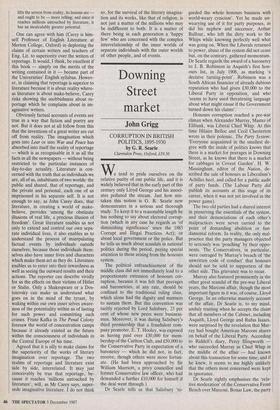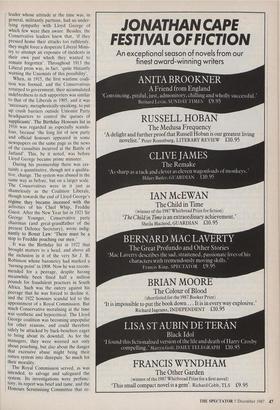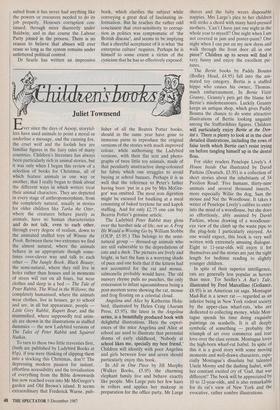Downing Street market
John Grigg
CORRUPTION IN BRITISH POLITICS, 1895-1930 by G. R. Searle
Clarendon Press, Oxford, £19.50
We tend to pride ourselves on the relative purity of our public life, and it is widely believed that in the early part of this century only Lloyd George and his associ- ates polluted the stream. Just how mis- taken this notion is G. R. Searle now demonstrates in a serious and thorough study. To keep it to a reasonable length he has nothing to say about electoral corrup- tion (which in any case he regards as 'of diminishing significance' since the 1883 Corrupt and Illegal Practices Act); or about local government or the police. But he tells us much about scandals in national politics during the period, paying special attention to those arising from the honours system.
The political enfranchisement of the middle class did not immediately lead to a proportionate extension of honours cor- ruption, because it was felt that peerages and baronetcies, at any rate, should be confined to the traditional ruling class, which alone had the dignity and manners to sustain them. But this convention was tacitly rejected by Lord Salisbury, 23 per cent of whose new peers were business- men. Moreover, it was during Salisbury's third premiership that a fraudulent com- pany promoter, E. T. Hooley, was exposed as having paid over £30,000 for mem- bership of the Carlton Club, and £50,000 to the Conservative Party in expectation of a baronetcy — which he did not, in fact, receive, though others were more fortun- ate. (He had been approached by Sir William Marriott, a privy councillor and former Conservative law officer, who had demanded a further £10,000 for himself if the deal went through.) Dr Searle tells us that Salisbury 're- garded the whole honours business with world-weary cynicism'. Yet he made un- wearying use of it for party purposes, as did his nephew and successor, Arthur Balfour, who left the dirty work to the Whips while knowing perfectly well what was going on. When the Liberals returned to power, abuse of the system did not cease but, on the contrary, gathered momentum. Dr Searle regards the award of a baronetcy to J. B. Robinson in Asquith's first hon- ours list, in July 1908, as marking 'a decisive turning-point'. Robinson was a South African financier of already dubious reputation who had given £30,000 to the Liberal Party in opposition, and who `seems to have used threatening language about what might ensue if the Government turned down his claims'.
Honours corruption reached a pre-war climax when Alexander Murray, Master of Elibank, was Liberal Chief Whip. At this time Hilaire Belloc and Cecil Chesterton wrote in their polemic, The Party System: `Everyone acquainted in the smallest de- gree with the inside of politics knows that there is a market for peerages in Downing Street, as he knows that there is a market for cabbages in Covent Garden'. H. W. Massingham, editor of the Nation, de- scribed the sale of honours as Liberalism's Achilles heel, and called for a public audit of party funds. (The Labour Party did publish its accounts at this stage of its career, when it was not yet involved in the power game).
The two old parties had a shared interest in preserving the essentials of the system, and their denunciations of each other's malpractices were never carried to the point of demanding abolition or fun- damental reform. In reality, the only mal- practice that the party managers objected to seriously was 'poaching' by their oppo- nents. The Conservatives, in particular, were outraged by Murray's breach of 'the unwritten code of conduct' that honours should not be sold to supporters of the other side. This grievance was to recur.
Murray also featured prominently in the other great scandal of the pre-war Liberal years, the Marconi affair, though the most important figure in it was, of course, Lloyd George. In an otherwise masterly account of the affair, Dr Searle is, to my mind, unduly trusting when he accepts the claim that all members of the Cabinet, including Asquith, Lloyd George and Rufus Isaacs, were surprised by the revelation that Mur- ray had bought American Marconi shares on behalf of the Liberal Party. According to Riddell's diary, Percy Illingworth who succeeded Murray as Chief Whip in the middle of the affair — had known about this transaction for some time; and if he knew, it seems to me highly unlikely that the others most concerned were kept in ignorance.
Dr Searle rightly emphasises the 'rela- tive moderation' of the Conservative Front Bench over Marconi. Bonar Law, the party leader whose attitude at the time was, in general, militantly partisan, had an under- lying sympathy with Lloyd George of which few were then aware. Besides, the Conservative leaders knew that, 'if they pressed home their attacks too ruthlessly, they might force a desperate Liberal Minis- try to attempt an exposure of incidents in their own past which they wanted to remain forgotten'. Throughout 1913 the Liberal press was, in fact, 'quite blatantly warning the Unionists of this possibility'.
When, in 1915, the first wartime coali- tion was formed, and the Conservatives returned to government, their accumulated indebtedness to rich supporters was similar to that of the Liberals in 1905, and it was 'necessary, metaphorically speaking, to put up crush barriers outside Unionist Party headquarters to control the queues of supplicants'. The Birthday Honours list in 1916 was regarded as especially scanda- lous, because 'the long list of new party and official honours appeared in some newspapers on the same page as the news of the casualties incurred at the Battle of Jutland'. This, be it noted, was before Lloyd George became prime minister.
During his premiership there was cer- tainly a quantitative, though not a qualita- tive, change. The system was abused in the same way as before, but on a larger scale. The Conservatives were in it just as shamelessly as the Coalition Liberals, though towards the end of Lloyd George's regime they became incensed with the activities of his Chief Whip, Freddie Guest. After the New Year list in 1921 Sir George Younger, Conservative party chairman (and great-grandfather of the present Defence Secretary), wrote indig- nantly to Bonar Law: 'There must be a stop to Freddie poaching our men.'
It was the Birthday list in 1922 that brought matters to a head, and above all the inclusion in it of the very Sir J. B. Robinson whose baronetcy had marked a 'turning-point' in 1908. Now he was recom- mended for a peerage, despite having meanwhile been fined half a million pounds for fraudulent practices in South Africa. Such was the outcry against his peerage that he was forced to decline it, and the 1922 honours scandal led to the appointment of a Royal Commission. But much Conservative moralising at the time was synthetic and hypocritical. The Lloyd George coalition was becoming unpopular for other reasons, and could therefore safely be attacked by back-benchers eager to bring about its downfall. As for the managers, they were worried not only about poaching, but also about the danger that excessive abuse might bring their rotten system into disrepute. So much for their morality.
The Royal Commission served, as was intended, to salvage and safeguard the system. Its investigations were perfunc- tory, its report was brief and tame, and the Honours Scrutinising Committee that re- suited from it has never had anything like the powers or resources needed to do its job properly. Honours corruption con- tinued, through more discreetly under Baldwin; and in due course the Labour Party joined in the process. There is no reason to believe that abuses will ever cease so long as the system remains under unfettered political control.
Dr Searle has written an impressive book, which clarifies the subject while conveying a great deal of fascinating in- formation. But he reaches the rather odd conclusion that over-sensitivity to corrup- tion in politics was symptomatic of 'the British disease', and seems to be implying that a cheerful acceptance of it is what 'the enterprise culture' requires. Perhaps he is himself to some extent a victim of the cynicism that he has so effectively exposed.












































































 Previous page
Previous page